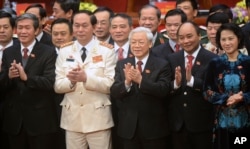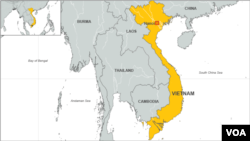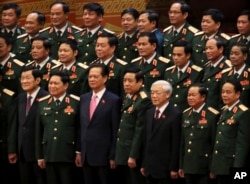Those hoping for a political showdown in Vietnam were disappointed, as the Communist Party introduced Thursday its preordained quartet of leaders, which included General Secretary Nguyen Phu Trong, whose term was extended, and the first woman elected to one of the country’s top four posts.
The party congress results ended months of speculation that Prime Minister Nguyen Tan Dung might shake things up and take Trong’s seat. Instead, the party returned to homeostasis in re-electing the somewhat conservative general secretary.
It also made safe bets with Deputy Prime Minister Nguyen Xuan Phuc for prime minister, Minister of Public Security Tran Dai Quang for president, and Legislative Vice Chair Nguyen Thi Kim Ngan for National Assembly chairwoman.
'Not really new faces'
“There are not really new faces, forceful characters, or individuals with charisma,” said Tuong Vu, a political science professor at the University of Oregon. “Perhaps the lady, Ms. Ngan, she’s an unknown. But her position is still low in the four positions. Maybe between now and the next congress she will rise, who knows.”
Ngan has become the first woman elevated to the party’s top brass, but Vu said the balance in geography – rather than gender – might explain her promotion. She is from southern Vietnam, Phuc is from the central region, and Quang and Trong are northerners.
Much has been made of the differences between Dung, as an economic reformer whose three children studied in the west, versus Trong, as a party stalwart who tilts toward China, the only communist country bigger than Vietnam.
But observers say the gears for Vietnam’s liberalization were set in motion years ago and will continue, no matter who comes to the helm.
Next generation of leaders
Professor Pham Quy Tho, of the Academy of Policy and Development in Hanoi, said the next generation of leaders know Vietnam must prepare to compete and integrate with the rest of the world.
Tho pointed to the onslaught of trade agreements that will bring foreign rivals, from the Trans-Pacific Partnership to the Association of Southeast Asian Nation’s Economic Community.
"There will be reforms, not just for the economy, but also for society, so that people can adapt to the requirements of the new economy and human resource needs,” said Tho, who teaches public policy.
Investors echoed his sentiments.
HSBC economist Izumi Devalier said in a research note that “the candidates all seem to basically agree that further decentralization of the economy is necessary to ensure rising living standards.”
Devalier suggested Vietnam consider, for example, loosening the ties between state companies and the banks that so easily lend to them.
Reforms likely
Similarly, Kevin Snowball, CEO of PXP Vietnam Asset Management, believes reforms are likely to move forward, if more slowly under Trong.
In an email to investors, Snowball said he hopes that before leaving office this summer, Dung will reassure “less market-savvy bureaucrats” that foreigners aren’t buying up state firms just to ransack them.
“Given that reforms, particularly those concerning the stock market, have come to a grinding halt over the past several months in the run-up [to the party congress], it is unlikely that reforms can get any slower than currently,” Snowball said.
The outcome of the party congress, which meets every five years, had been predicted for days.
Yet some Dung supporters still got their hopes up, even though, as Vu says, a single person wouldn’t be decisive in a system that rules by consensus.
Regardless of Dung’s individual power, Vietnamese gravitated to him for channeling their insecurities about potential encroachment from China.
While this year’s party votes attracted more attention and internet chatter than usual, most Vietnamese carried on with their lives.
“To be honest I’m not really interested in politics,” said Nguyen Huyen, who works for a charity serving the disabled. “I know I can’t change anything.”














